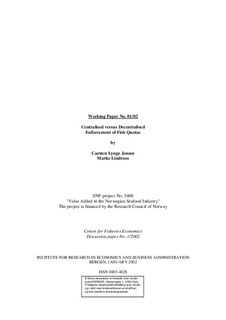Centralised versus decentralised enforcement of fish quotas
Working paper, Working paper

Åpne
Permanent lenke
http://hdl.handle.net/11250/165808Utgivelsesdato
2002-01Metadata
Vis full innførselSamlinger
- Working papers (SNF) [809]
Sammendrag
The purpose of this paper is to consider under what circumstances it is better to have centralised enforcement of catch quotas and when it is better to leave enforcement to the countries themselves. It is shown for a two-country case that a welfare gain is obtained under centralised enforcement at the federal level. The result depends critically on the difference in the unit cost of enforcement at the federal and the Member State (regional) level. If the Member States have a sufficiently large cost advantage in enforcing quotas they can be better off under decentralised enforcement. In addition, the result depends on the proportion of foreign fishermen in the domestic fishing zone. The higher is the proportion of foreign fishermen in the domestic zone the better is decentralised enforcement of quotas.
Utgiver
SNF/Centre for Fisheries EconomicsSerie
Working Paper2002:1
Discussion Paper
2002:1